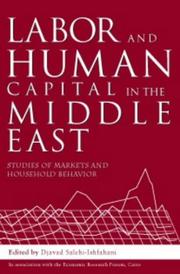| Listing 1 - 8 of 8 |
Sort by
|
Digital
Year: 2011 Publisher: Cambridge, Mass. National Bureau of Economic Research
Abstract | Keywords | Export | Availability | Bookmark
 Loading...
Loading...Choose an application
- Reference Manager
- EndNote
- RefWorks (Direct export to RefWorks)
This paper tests the differential effects of the generosity of the welfare state under free migration and under policy-controlled migration, distinguishing between source developing and developed countries. We utilize free-movement within the EU to examine the free migration regime and compare that to immigration into the EU from two other groups, developed and developing source countries, to capture immigration-restricted regimes. We standardize cross-country education quality differences by using the Hanushek-Woessmann (2009) cognitive skills measure. We find strong support for the "Magnet Hypothesis" under the free-migration regime, and the "Fiscal Burden Hypothesis" under the immigration- restricted regime even after controlling for differences in returns to skills in source and host countries. We also find a significant differences across host-country policy regimes in the effects of returns to skills on the skill mix of immigrants.
Digital
Year: 2011 Publisher: Cambridge, Mass. National Bureau of Economic Research
Abstract | Keywords | Export | Availability | Bookmark
 Loading...
Loading...Choose an application
- Reference Manager
- EndNote
- RefWorks (Direct export to RefWorks)
This paper revisits the magnet hypothesis and investigates the impact of the welfare generosity on the difference between skilled and unskilled migration rates. The main purpose of the paper is to assess the role of mobility restriction on shaping the effect of the welfare state genrosity. In a free migration regime, the impact is expected to be negative on the skill composition of migrants while in a restricted mobility regime, the impact will be the opposite, as voters will prefer selective migration policies, favoring skilled migrants who tend to be net contributors to the fiscal system. We utilize the free labor movement within EUR (the EU, Norway and Switzerland) and the restricted movement from outside of the EUR to compare the free migration.
Digital
Abstract | Keywords | Export | Availability | Bookmark
 Loading...
Loading...Choose an application
- Reference Manager
- EndNote
- RefWorks (Direct export to RefWorks)
Book
Year: 2021 Publisher: Washington, D.C. : The World Bank,
Abstract | Keywords | Export | Availability | Bookmark
 Loading...
Loading...Choose an application
- Reference Manager
- EndNote
- RefWorks (Direct export to RefWorks)
This paper examines the impact of the legal status of overseas migrants on their wages upon return to the home country. Using unique data from the Arab Republic of Egypt, which allows distinguishing between return migrants according to whether their international migration was documented or undocumented, the paper examines the impact of illegal status on wages upon return. Relying on a conditional mixed process model, which takes into account the selection into emigration, return, and the legal status of temporary migration, the analysis finds that, upon return, undocumented migrants experience a wage penalty compared with documented migrants, as well as relative to non-migrants. The results are the first to show the impact of undocumented migration on the migrant upon return to the country of origin.
Migrant Labor --- Poverty Reduction --- Return Migration --- Social Protections and Labor --- Undocumented Migration --- Wages --- Wages, Compensation and Benefits
Book
Year: 2011 Publisher: Cambridge, Mass. National Bureau of Economic Research
Abstract | Keywords | Export | Availability | Bookmark
 Loading...
Loading...Choose an application
- Reference Manager
- EndNote
- RefWorks (Direct export to RefWorks)
This paper revisits the magnet hypothesis and investigates the impact of the welfare generosity on the difference between skilled and unskilled migration rates. The main purpose of the paper is to assess the role of mobility restriction on shaping the effect of the welfare state genrosity. In a free migration regime, the impact is expected to be negative on the skill composition of migrants while in a restricted mobility regime, the impact will be the opposite, as voters will prefer selective migration policies, favoring skilled migrants who tend to be net contributors to the fiscal system. We utilize the free labor movement within EUR (the EU, Norway and Switzerland) and the restricted movement from outside of the EUR to compare the free migration.
Book
Year: 2011 Publisher: Cambridge, Mass. National Bureau of Economic Research
Abstract | Keywords | Export | Availability | Bookmark
 Loading...
Loading...Choose an application
- Reference Manager
- EndNote
- RefWorks (Direct export to RefWorks)
This paper tests the differential effects of the generosity of the welfare state under free migration and under policy-controlled migration, distinguishing between source developing and developed countries. We utilize free-movement within the EU to examine the free migration regime and compare that to immigration into the EU from two other groups, developed and developing source countries, to capture immigration-restricted regimes. We standardize cross-country education quality differences by using the Hanushek-Woessmann (2009) cognitive skills measure. We find strong support for the "Magnet Hypothesis" under the free-migration regime, and the "Fiscal Burden Hypothesis" under the immigration- restricted regime even after controlling for differences in returns to skills in source and host countries. We also find a significant differences across host-country policy regimes in the effects of returns to skills on the skill mix of immigrants.
Digital
Year: 2016 Publisher: Louvain-la-Neuve Université catholique de Louvain. Institut de recherches économiques et sociales
Abstract | Keywords | Export | Availability | Bookmark
 Loading...
Loading...Choose an application
- Reference Manager
- EndNote
- RefWorks (Direct export to RefWorks)


ISBN: 0863722954 Year: 2001 Publisher: Reading : Ithaca press,
Abstract | Keywords | Export | Availability | Bookmark
 Loading...
Loading...Choose an application
- Reference Manager
- EndNote
- RefWorks (Direct export to RefWorks)
Households --- Human capital --- Labor market --- Economic aspects
| Listing 1 - 8 of 8 |
Sort by
|

 Search
Search Feedback
Feedback About UniCat
About UniCat  Help
Help News
News